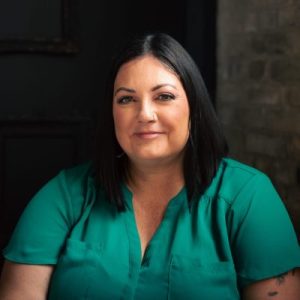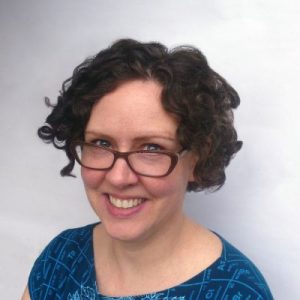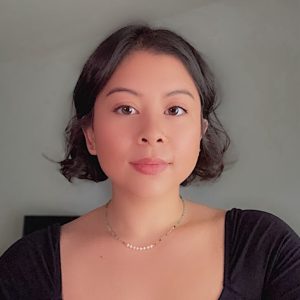About Us, About this Book
Meet the Editors
In working to share this collection, we believe it is important to be transparent about who we are, where we come from, and the perspectives we bring into this work. Our positionalities shape the ways we listen, interpret, and present the voices within these pages. They also guide our responsibilities in ensuring the material is represented with care, respect, and accountability.
Gladys Rowe, PhD (Swampy Cree)
 Dr. Gladys Rowe is a Muskego Inninew (Swampy Cree) person and a member of Fox Lake Cree Nation in Northern Manitoba, with ancestral relations from Ireland, England, Norway, and Ukraine. She lives in Washington State, where she works as an independent artist and scholar and leads Indigenous Insights Collective, a consulting firm prioritizing Indigenous-centered research and evaluation. Gladys earned her PhD in Interdisciplinary Studies (Social Work, Native Studies, English, Film & Theatre) from the University of Manitoba in 2021.
Dr. Gladys Rowe is a Muskego Inninew (Swampy Cree) person and a member of Fox Lake Cree Nation in Northern Manitoba, with ancestral relations from Ireland, England, Norway, and Ukraine. She lives in Washington State, where she works as an independent artist and scholar and leads Indigenous Insights Collective, a consulting firm prioritizing Indigenous-centered research and evaluation. Gladys earned her PhD in Interdisciplinary Studies (Social Work, Native Studies, English, Film & Theatre) from the University of Manitoba in 2021.
Gladys integrates Indigenous research methodologies, storytelling, and arts-based practices to reimagine evaluation as relational, reciprocal, and transformative. She has published widely, produces Indigenous Insights: An Evaluation Podcast, and continues to walk alongside communities to strengthen Indigenous knowledge, language, and practice for future generations.
Nadine Flagel, PhD (Settler)
 Dr. Nadine Flagel is a third-generation European settler joining you from unceded lands of the Musqueam, Tsleil-Waututh, and Squamish Peoples. Her post-graduate research in English Literature involved what we would now (after Kimberlé Crenshaw) call intersectional frameworks of analysis.
Dr. Nadine Flagel is a third-generation European settler joining you from unceded lands of the Musqueam, Tsleil-Waututh, and Squamish Peoples. Her post-graduate research in English Literature involved what we would now (after Kimberlé Crenshaw) call intersectional frameworks of analysis.
Whether serving as editor, scholar, or teacher, she has a proven commitment to inclusivity and diversity in language arts, visual arts, and social sciences. Working with Dr. Rowe’s and her collaborators’ interpretations of Indigenous evaluation and its role in resurgence offers humbling opportunities to listen to and amplify a plurality of Indigenous voices insisting on change. Nadine is an avid reader, caretaker of plant and family life, and textile artist.
Taylor Wilson (Ojibwe, Cree, Filipina)
 Taylor Wilson is an Ojibwe, Cree, and Filipina scholar and member of Fisher River Cree Nation on Treaty 5 territory, with connections to Peguis First Nation (Treaty 1), Fairford First Nation (Treaty 2), and the Ilocano region of the Philippines. She grew up between Fisher River and Winnipeg (Treaty 1 and homeland of the Métis Nation) and now lives and works primarily the traditional territory of the xʷməθkʷəy̓əm (Musqueam) Nation. Taylor is currently pursuing her PhD in Integrated Studies in Land and Food Systems at the University of British Columbia.
Taylor Wilson is an Ojibwe, Cree, and Filipina scholar and member of Fisher River Cree Nation on Treaty 5 territory, with connections to Peguis First Nation (Treaty 1), Fairford First Nation (Treaty 2), and the Ilocano region of the Philippines. She grew up between Fisher River and Winnipeg (Treaty 1 and homeland of the Métis Nation) and now lives and works primarily the traditional territory of the xʷməθkʷəy̓əm (Musqueam) Nation. Taylor is currently pursuing her PhD in Integrated Studies in Land and Food Systems at the University of British Columbia.
Taylor’s work is rooted in Indigenous food sovereignty, health, and evaluation, with a commitment to Indigenous methodologies, relational accountability, and data sovereignty. She has contributed to community-based research and evaluation, curriculum development, and taught in Australia, Hawai’i, and across central and western Canada. She began her journey with Dr. Gladys Rowe and the Indigenous Insights team in 2024 offering support to the many projects, partners, and communities they work with. She describes herself as a learner, listener, and helper to strengthen relationships, stories, and practices that sustain Indigenous life for generations to come.
While our experiences, identities, and relationships to this work are distinct, we are united by a shared commitment to honour the stories, knowledge systems, and evaluative practices offered by the contributors, and to ensure that this book serves as a space of respect, reciprocity, and relational accountability. May these pages serve as a bundle, a gathering of teachings, stories, and practices, and be carried forward in love, respect, and responsibility.
This Book, A Living Resource
The work of Indigenous evaluation is dynamic, shaped by evolving community needs, new collaborations, and ongoing acts of resurgence. While this book is complete in its current form, it is also part of an ongoing conversation. Future editions and updates may expand, adapt, or deepen the content as relationships and understandings grow. We welcome dialogue, feedback, and new contributions to keep this resource alive and relevant.
We invite you to approach this book as you would approach entering a community space, with respect, openness, and readiness to listen. The voices gathered here are generous in their sharing, and we carry the responsibility to honour their words. If you have questions about how to share, teach, or acknowledge these words, please consult the “Sharing and Use Guidelines” section at the end of the book.
May this bundle of conversations and reflections accompany you in your own journey, wherever it may lead.
– Gladys, Nadine, and Taylor
